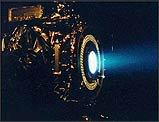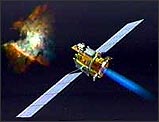ION ENGINES

.gif) Instead of burning chemical fuels, ion
engines are electrically charged and work by ejecting positive ions
from the back of the rocket, propelling the spacecraft forwards. The
thrust is tiny; in fact it's comparable to the pressure of a piece
of paper on your hand. However, the ion engine is extremely
efficient, allowing the fuel to last far longer than in conventional
rockets, making these spacecraft lighter and cheaper to launch.
Instead of burning chemical fuels, ion
engines are electrically charged and work by ejecting positive ions
from the back of the rocket, propelling the spacecraft forwards. The
thrust is tiny; in fact it's comparable to the pressure of a piece
of paper on your hand. However, the ion engine is extremely
efficient, allowing the fuel to last far longer than in conventional
rockets, making these spacecraft lighter and cheaper to launch.

.gif) Deep Space 1
Deep Space 1
Ion engines are
already being used in many satellite systems and in 1998 NASA
launched a probe called 'Deep Space 1' to test their effectiveness.
Due to its increased efficiency, Deep Space 1 has now been in space
for longer than all the conventional spacerockets ever made put
together.
Speed of spacecraft
Future missions for these ion
engine could include comet sample returns, observations of the rings
of Saturn
and a landing on Jupiter's moon, Europa.
Their light mass means that ion powered spacecraft can gradually
accelerate to extremely high speeds. For example, if an ion engine
was chosen for the forthcoming Rosetta comet
mission in 2011, it could rendezvous with Comet Wirtanen and return
samples back home in around five years. Conventional rockets would
take nine years just to catch the comet, let alone return with the
precious bounty.
Other near-term options for deep-space travel are solar
sails and nuclear
rockets.